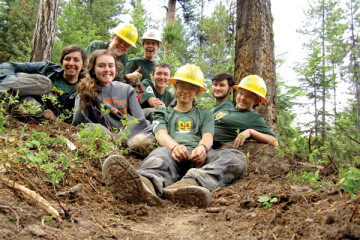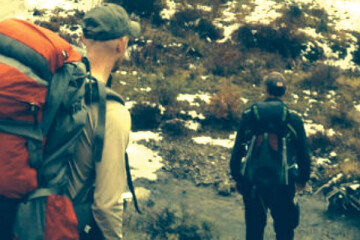Youth Dynamics
Helping Kids, Helping Montana
When Jamie Williams and her husband took in her sister’s kids two years ago, she knew it would be a big transition for everyone, including her own children. The family practically doubled in size overnight. The children are all very loving and supportive of each other, but figuring out how to share space, toys and their parents’ time was a challenge. Williams knew she needed help and after quite a bit of research, she found Youth Dynamics.
Youth Dynamics is an enormous organization that works with children throughout the state of Montana. When kids are struggling, “families often don’t know what to do,” explained Nina Hernandez, development director for the organization. “We want to really destigmatize mental illness for kids. We also try to prevent entrance to the juvenile justice system. Most kids are in our services because of some kind of neglect or abuse.” 
Erasing the Stigma of Mental Illness
The doctors, counselors, and case workers employed by Youth Dynamics are committed to helping the public recognize that the kids they treat are just normal kids who have been subjected to abnormal circumstances. Considering the increase in mass shootings at schools around the country and suicide attempts in children, their work is incredibly important. Montana has one of the highest suicide rates in the nation and the majority of those who commit suicide suffer from mental illness, most commonly depression. According to the 2011 Youth Risk Behavior Survey conducted by the CDC’s National Center for Health Statistics, 6.5% of Montana high school students had attempted suicide within the year prior to the survey; this percentage more than doubles for Native American students living on reservations.
High school students aren’t the only ones at risk. For children ages 10 to 14, suicide is the number one cause of preventable death in the state, according to Montana’s Office of Public Instruction. Youth Dynamics offers a wide variety of services to treat children of all ages who have varying degrees of mental illness. The organization has group homes for kids in the most severe situations, including one home for highly sexualized kids who have been physically abused and have started abusing others.
Family-Based Treatment
However, they keep kids in a family or community setting whenever possible. “We don’t institutionalize these kids” if we don’t have to, Hernandez explained. “We want to catch them in crisis before they hurt themselves or others.” The unique therapy offered by Youth Dynamics focuses on family-based models.
Williams said her family benefits tremendously from this approach. Each of her five children has a counselor, case manager, and FSA, which is someone who takes each child to do something fun and adventurous. Williams’ kids have been hiking, visited the Museum of the Rockies, and gone rock climbing at Spire Climbing Center. “They get out to do things they don’t normally do,” Williams said.
In addition to getting out for some fun with their FSAs, Williams’ kids meet with a counselor once a week and with a case manager once or twice every month. Counselors are available to talk with parents as well. Everyone involved with the family meets regularly to discuss the issues the different kids are facing and work out a cohesive plan to help them all adjust to life’s challenges.
Individual Focus
Youth Dynamics tailors treatment to fit the needs of the individual. For example, Williams’ oldest son, 15-year old Leo, began sacrificing his interests and aspirations to help around the house and with the younger children. His counselor helped him, and his family, recognize that he had become depressed. Together they created an individualized education program that will be implemented at Leo’s school to ensure that he gets the attention he needs. He looks forward to spending time every Wednesday with his counselor; they head out for “coffee therapy” and connect over casual conversation.
Eight-year old Sam is looking forward to camp this summer. Youth Dynamics helped each kid get a scholarship for summer camp. The organization often gets creative when finding ways to help kids learn to handle their problems. Practicing sports and being on a team builds confidence and supportive friendships. A healthy social life contributes to a healthy self-perception, and with that in mind, Youth Dynamics will also arrange respite care—kids having a hard time at home get the opportunity to spend the weekend with another family.
Hernandez explained that her organization’s goal is twofold. They aim to change public perception about mental illness and catch youth mental health issues before they become dangerous problems. One quarter of youth experience some type of mental health problem, but because so much misinformation about mental illness exists, these youth often face discrimination that further isolates them and makes getting help harder. Youth Dynamics offers Mental Health First Aid classes for anyone and everyone interested in learning more about how to recognize the signs of mental illness or substance abuse challenges. More information about these classes and Youth Dynamics can be found at the website: www.youthdynamics.org
“Our ultimate goal is to get people and families to feel comfortable calling,” Hernandez said. Seeking help as soon as a problem is recognized may make recovery easier. Williams’ kids are a testament to the benefits of having supportive adults willing to listen. In addition to their parents, her children enjoy talking and playing with their counselors, who “feel like part of the family,” she said.
“They help us solve problems,” nine-year old Emily explained. “They help us with the stuff we can’t get out of our head,” six-year old Nate added.


